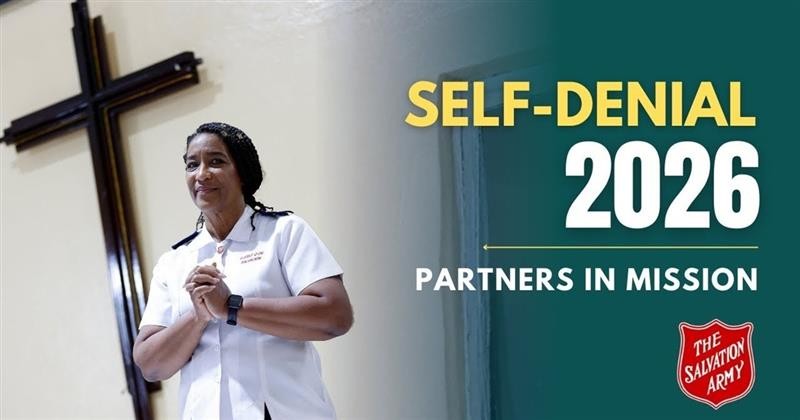Have you ever jumped to a conclusion before gathering all of the facts? When someone is late for a meeting, misses an important deadline or fails to keep a promise, sometimes we make assumptions about why without all the necessary information. We move from thought to action without being self-aware and managing our emotions. The ability to lead ourselves in all circumstances is a key aspect of leadership.
The Salvation Army in Canada and Bermuda has adopted the LEADS Leadership Capability Framework as a strategic approach to leadership development (visit salvationist.ca/leads). In this series, we will explore each of the five capability domains, beginning with LEAD SELF: self-motivated leaders are self-aware, develop themselves, manage themselves and demonstrate character.
Captain Ruth Gillingham, while in the position of divisional youth secretary for the Alberta and Northern Territories Division, attended a LEADS learning series. Here, she shares her experience with LEAD SELF in the context of Salvation Army camping ministry:
The Salvation Army’s camping ministry is one of the most effective ways we have of discipling our young people. They are entrusted with the missional responsibility of proclaiming the truth of Jesus Christ and overseeing the welfare of children who often present with many complex needs.
Our young leaders are expected to demonstrate behaviour that reflects The Salvation Army’s code of conduct and, more importantly, biblical standards of compassion, self-control, kindness, gentleness and goodness, to name a few.
These are challenging expectations for young people who are still navigating their own physical, psychological and spiritual development, and especially in the context of intense community. Camp is a highly social environment where individuals are in contact with one another for long periods of time without a break. Often staff work together, eat together, sleep in the same cabin and do not have a lot of space to decompress.
The LEADS framework has been an effective way to help young staff develop in the area of leading self, especially in relation to co-workers and campers. The “ladder of inference” has been a constructive tool to help develop self-awareness in staff, by learning to understand the thinking process they go through, usually without realizing it, to get from an observation to a decision or action.
The thinking stages are depicted as rungs on a ladder. By teaching individuals to slow down and reflect before moving from thought to action, many interpersonal conflicts and poor behavioural choices are averted. The ladder of inference has been used to help individuals become aware of their own thoughts and reasoning. It is also used to help individuals become aware of the reasoning process of others, thereby helping expand their understanding of other people’s motives. It teaches them to actively engage others in conversation by choosing the option of positive inquiry (asking questions) rather than jumping to conclusions.
When conflict arises in the camp setting, we can then address each situation by using a shared language and process to look at the situation and use it as a place of learning and growth.
As we look to the future, the development of young leaders is fundamental to The Salvation Army, and it must begin with the development of self. What is true for young leaders is also true for the most experienced.
Paul Carew is the leadership development secretary. Captain Ruth Gillingham is the corps officer at Cascade Community Church in Abbotsford, B.C.
Illustration: DNY59/E+ via Getty Images
The Salvation Army in Canada and Bermuda has adopted the LEADS Leadership Capability Framework as a strategic approach to leadership development (visit salvationist.ca/leads). In this series, we will explore each of the five capability domains, beginning with LEAD SELF: self-motivated leaders are self-aware, develop themselves, manage themselves and demonstrate character.
Captain Ruth Gillingham, while in the position of divisional youth secretary for the Alberta and Northern Territories Division, attended a LEADS learning series. Here, she shares her experience with LEAD SELF in the context of Salvation Army camping ministry:
The Salvation Army’s camping ministry is one of the most effective ways we have of discipling our young people. They are entrusted with the missional responsibility of proclaiming the truth of Jesus Christ and overseeing the welfare of children who often present with many complex needs.
Our young leaders are expected to demonstrate behaviour that reflects The Salvation Army’s code of conduct and, more importantly, biblical standards of compassion, self-control, kindness, gentleness and goodness, to name a few.
These are challenging expectations for young people who are still navigating their own physical, psychological and spiritual development, and especially in the context of intense community. Camp is a highly social environment where individuals are in contact with one another for long periods of time without a break. Often staff work together, eat together, sleep in the same cabin and do not have a lot of space to decompress.
The LEADS framework has been an effective way to help young staff develop in the area of leading self, especially in relation to co-workers and campers. The “ladder of inference” has been a constructive tool to help develop self-awareness in staff, by learning to understand the thinking process they go through, usually without realizing it, to get from an observation to a decision or action.
The thinking stages are depicted as rungs on a ladder. By teaching individuals to slow down and reflect before moving from thought to action, many interpersonal conflicts and poor behavioural choices are averted. The ladder of inference has been used to help individuals become aware of their own thoughts and reasoning. It is also used to help individuals become aware of the reasoning process of others, thereby helping expand their understanding of other people’s motives. It teaches them to actively engage others in conversation by choosing the option of positive inquiry (asking questions) rather than jumping to conclusions.
When conflict arises in the camp setting, we can then address each situation by using a shared language and process to look at the situation and use it as a place of learning and growth.
As we look to the future, the development of young leaders is fundamental to The Salvation Army, and it must begin with the development of self. What is true for young leaders is also true for the most experienced.
Paul Carew is the leadership development secretary. Captain Ruth Gillingham is the corps officer at Cascade Community Church in Abbotsford, B.C.
Illustration: DNY59/E+ via Getty Images










Leave a Comment